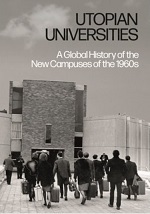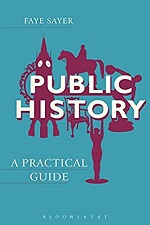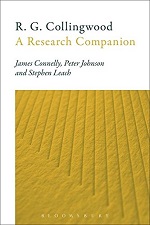Posts com a Tag ‘Bloomsbury (E)’
Rethinking historical time: new approaches to presentism | Marek Tamm, Laurent Olivier
O estudo do tempo histórico (temporalidade) vem se modificando recentemente no campo da teoria e filosofia da história, como apontou Ethan Kleinberg em seu artigo Introduction: The New Metaphysics of Time, publicado em 2012. Após a publicação de Kleinberg, outros estudiosos tentaram mapear e demonstrar essas mudanças na temporalidade apontadas por ele, sendo o livro Rethinking Historical Time, New Approaches to Presentism organizado por Marek Tamm e Laurent Olivier uma resultante desta renovada forma de pensar a temporalidade. Publicado em 2019 pela Bloomsbury Academic, o livro é uma grande colaboração entre vários teóricos que desenvolveram seus capítulos e que foram organizados nessa unidade por Marek Tamm e Laurent Olivier. Leia Mais
Utopian Universities / Jill Pellew e Miles Taylor
Milles Taylor. Foto: Telegraph India /
 The most remarkable feature of the mould-breaking expansion of higher education that took place across the world in the 1960s was the foundation of some 200 entirely new universities. In most countries, growth had previously been confined largely to existing institutions or to lesser colleges of various kinds which were required to undergo a long period of tutelage and development before they could be considered for university status. But, in the 1960s, campuses were started from scratch, nearly always funded by the state, usually promising new institutional structures and innovative curriculum design, often boasting eye-catching new buildings by star architects. Examples of this phenomenon can be found across the world, especially in the countries of the former British empire, but, both at the time and since, developments in the UK attracted most attention, providing the models for what was to follow elsewhere. In the space of four years, seven new universities were opened in England: Sussex (1961), East Anglia [UEA], York (both 1963), Lancaster (1964), Essex, Kent, and Warwick (all 1965). Belatedly, and without either the brio or the funding of ‘the magnificent seven’, they were joined by the University of Stirling (1967) and the New University of Ulster (1968); the latter remains the last entirely new publicly-funded university to be established in the UK. Utopian Universities brings together twenty contributions on aspects of the new universities of the 1960s; two thirds of them concentrate on developments in the UK, with the rest addressing selected examples elsewhere, both in the former British dominions and in Europe. Leia Mais
The most remarkable feature of the mould-breaking expansion of higher education that took place across the world in the 1960s was the foundation of some 200 entirely new universities. In most countries, growth had previously been confined largely to existing institutions or to lesser colleges of various kinds which were required to undergo a long period of tutelage and development before they could be considered for university status. But, in the 1960s, campuses were started from scratch, nearly always funded by the state, usually promising new institutional structures and innovative curriculum design, often boasting eye-catching new buildings by star architects. Examples of this phenomenon can be found across the world, especially in the countries of the former British empire, but, both at the time and since, developments in the UK attracted most attention, providing the models for what was to follow elsewhere. In the space of four years, seven new universities were opened in England: Sussex (1961), East Anglia [UEA], York (both 1963), Lancaster (1964), Essex, Kent, and Warwick (all 1965). Belatedly, and without either the brio or the funding of ‘the magnificent seven’, they were joined by the University of Stirling (1967) and the New University of Ulster (1968); the latter remains the last entirely new publicly-funded university to be established in the UK. Utopian Universities brings together twenty contributions on aspects of the new universities of the 1960s; two thirds of them concentrate on developments in the UK, with the rest addressing selected examples elsewhere, both in the former British dominions and in Europe. Leia Mais
Public History. A Practical Guide – SAYER (IJHLTR)
Faye Sayer /
 SAYER, Faye. Public History. A Practical Guide. London, Bloomsbury, 2015. Resenha de: HARNETT, Penelope. International Journal of Historical Learning Teaching and Research, London, v.14, n.2, p.150, 2017.
SAYER, Faye. Public History. A Practical Guide. London, Bloomsbury, 2015. Resenha de: HARNETT, Penelope. International Journal of Historical Learning Teaching and Research, London, v.14, n.2, p.150, 2017.
What’s the point of history? In a time when the value of studying the humanities is often questioned this book provides a genuine attempt to analyse how history impacts on people’s lives. The book explains how the past connects with its public, discussing the role which interpretations play in contributing to social and cultural traditions alongside developing personal understanding. Public History is described as a dynamic undertaking involving dialogue between historians, the past and different audiences and Sayer provides detailed examples of how this occurs in different spheres.
Chapters focus on a different aspects of public history (e.g. museums, archives and heritage centres, teaching history, media history etc.) offering readers a comprehensive guide to a range of issues. The context of each chapter is explained in helpful introductions which are then followed by discussion, illustrated by specific case studies. Leia Mais
R. G. Collingwood: A Research Companion – CONNELLY et al (IJHLTR)
 CONNELLY, James Connelly; JOHNSON, Peter Johnson; LEACH, Stephen. R. G. Collingwood: A Research Companion. London: Bloomsbury, 2015. 293p. Resenha de: HUGHES-WARRINGTON, Mamie. International Journal of Historical Learning Teaching and Research, London, v.13, n.2, p.14-15, 2016.
CONNELLY, James Connelly; JOHNSON, Peter Johnson; LEACH, Stephen. R. G. Collingwood: A Research Companion. London: Bloomsbury, 2015. 293p. Resenha de: HUGHES-WARRINGTON, Mamie. International Journal of Historical Learning Teaching and Research, London, v.13, n.2, p.14-15, 2016.
In 1992, I became the fortunate owner of a small photocopied guide to the R. G. Collingwood papers in the Bodleian Library, Oxford. This much-thumbed, much-annotated booklet became the first item in a collection of transcriptions and notes that soon spilled over the limits of a single folder and settled into a row of boxes that continues to grow today.
Such was the lot of a researcher on the life and works of Robin George Collingwood (1889– 1943), philosopher, archaeologist, historian and luminary of Oxford University in the first half of the twentieth century. Until now. Connelly, Johnson and Leach’s companion for researchers admirably fulfils its aims of providing a comprehensive and systematic listing of materials by and on Collingwood and of placing those materials in the context of a detailed chronology of his life (p. 2).
The book is helpfully divided into eight sections, covering a biography, a chronology of life events, letters, unpublished and published works by Collingwood and his commentators and details of the many archive holdings. The largest section – a description of correspondence – is arguably the most helpful, for the volume and scattered nature of holdings provides a considerable challenge to any budding researcher. The chronology is also a powerful aide to understanding Collingwood’s battle with failing health, which he describes rather poignantly in a 1941 letter to Christopher Hawkes as the time ‘since the superincumbent sword of Damocles became clearly visible, and here I am driving a pen, though not well’ (p. 137).
To those who would argue that it is an important rite of passage for new researchers to find materials for themselves, the simplest rebuttal is that comprehensive aids for research assist in the development of a comprehensive and nuanced understanding of the ideas and life events of individuals and groups. Moreover, they minimise the risk of misunderstandings that arise from not having considered particular materials, protecting students, early career researchers and those interested in Collingwood because of his connections to others from the dreaded ‘but you haven’t read x’ of the experienced Collingwood researcher.
There is a little to quibble about the book. The biography (pp. 3–6) gives the reader little sense of The Idea of History as a posthumous collection brought together by Collingwood’s student, T. M. Knox, or of the significant discovery in 1993 of missing chapters from The Principles of History in the basement of Oxford University Press. The published Collingwood is only the tip of an extensive manuscript collection that shows the evolution of his thought at work.
Nor does the book give the reader a sense of what to expect when they see a Collingwood manuscript for the first time. Collingwood’s handwriting is far from challenging as far as philosophers go, and his use of recycled exam scripts provide a helpful reminder of the Oxford in which he worked. But readers do need to be warned about his liberal use of ancient Greek terms, as well as his predilection for quoting from poems without noting their source. What was customary intertextual reference in Oxford of the 1930s can take the present day reader by surprise, and the best remedy is to begin with the revised editions of Collingwood’s philosophical work – starting notably with David Boucher’s edition of The New Leviathan (1992) – as they contain transcriptions and explanatory notes to a significant group of manuscripts.
Finally, the collection does not explicitly give the reader a sense of the balance of Collingwood’s interests in toto, as distinct from a year-by-year summary. This is a significant gap, as an analysis of the Collingwood corpus can remind us not to pass over his contributions to aesthetics when we see the vast lists of writings on archaeology, metaphysics and the philosophy of history.
But these are minor quibbles, and given the significant opportunities for research posed by a still largely untapped group of writings, this Research Companion is a welcome introduction to those new to Collingwood studies.
Marnie Hughes-Warrington – Australian National University, Australia. E-mail: marnie.hughes-warrington@anu.edu.au.
[IF]Merchants of doubt. How a handful of scientists obscured the truth on issues from tobacco smoke to global warming – ORESKES (SS)
ORESKES, Naomi; CONWAY, Eric M. Merchants of doubt. How a handful of scientists obscured the truth on issues from tobacco smoke to global warming. New York: Bloomsbury, 2010. Resenha de: LEITE, José Correa. Controvérsias científicas ou negação da ciência? A agnotologia e a ciência do clima. Scientiæ Studia, São Paulo, v.12, n. 1, p. 179-89, 2014.
Na medida em que se torna determinante da dinâmica da economia e da política, a tecnociência passa a mediar as definições e as tomadas de decisão sobre um número crescente de questões. Ela se torna um campo de batalha de interesses contraditórios, onde o avanço do conhecimento científico amiúde questiona diretamente os poderes estabelecidos. Como a ciência fornece as bases para os discursos mais legítimos da sociedade, aqueles que são questionados por ela têm que reagir contrapondo argumentos e teorias supostamente científicos, mesmo quando não o sejam. O caso da relação entre o hábito de fumar e o aumento da incidência de câncer é o exemplo clássico, mas a indução da ignorância ou da dúvida sobre temas onde já existe um consenso científico tornouse uma prática comum na sociedade atual. A leitura de Mooney (2005) e Michaels (2008) permite pôr em discussão dezenas de tópicos de conflito nas mais variadas áreas. Assim, as controvérsias escalam até ganharem a conotação de uma verdadeira guerra cultural no caso da emissão dos gases de efeito estufa, os quais, segundo indicação da própria ciência, produzem o aquecimento global (impacto negado ou questionado pelas indústrias de combustível fóssil e de geração de energia em termoelétricas).
Robert Proctor, historiador da ciência da Universidade de Stanford, cunhou um termo para designar o estudo da negação da ciência com vistas a produzir a dúvida ou a ignorância – em oposição ao estudo do conhecimento pela epistemologia –, a saber, agnotology, que podemos traduzir por agnotologia (do grego agnosis, não conhecimento). O propósito da agnotologia seria “promover o estudo da ignorância, desenvolvendo ferramentas para compreender como e porque várias formas de conhecimento não ‘emergiram’, ou desapareceram, ou foram retardadas ou negligenciadas por longo tempo, para melhor ou para pior, em vários pontos da história” (Proctor & Schiebinger, 2008, p. vii). Leia Mais


